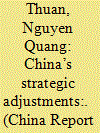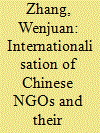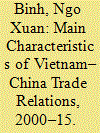|
|
|
Sort Order |
|
|
|
Items / Page
|
|
|
|
|
|
|
| Srl | Item |
| 1 |
ID:
154727


|
|
|
|
|
| Summary/Abstract |
After the eighteenth Congress of the Chinese Communist Party, China adjusted its diplomatic strategy and
transformed its pattern of economic development. This has had and will continue to have both a positive
and a negative impact on the international financial institutions and the regional and global economy.
The ‘One Belt, One Road’ (OBOR) strategy, combined with the Asian Infrastructure Investment Bank
(AIIB) and the internationalisation of the yuan, is the main focus, and exerts a strong impact on the
existing international financial institutions as well as the economic relations between China and many
other countries in the world. It has attracted many developed and developing countries to join the AIIB.
It also has made many emerging economies become closely linked to China. Moreover, it contributes to
the emergence of many ‘asymmetric’ pairs of economic relations between China and its neighbours. China
is now connected with Europe through an overland route as well as through the boosting of economic,
trade and investment ties between Asia and Europe. Furthermore, while Europe has been concerned
about China’s unfair competition and the dependence on Chinese investment, ASEAN has increasingly
deepened the mutual economic dependence between itself and Beijing. A negative outcome of this is the
rising economic dependence on China of quite a few ASEAN member states, including Vietnam.
|
|
|
|
|
|
|
|
|
|
|
|
|
|
|
|
| 2 |
ID:
154725


|
|
|
|
|
| Summary/Abstract |
This article proposes an exploration of language as a cultural voice in the research of leadership, and
the conception that the dyadic relationship between leader and follower can be further looked into
semiotically within the discourses of language. In particular, this research hopes to bring into view the
plausible relationship between Chinese politeness and leader–follower interactions as well as its impact
on followers’ career development. The appropriate (non)usage of second-person pronoun nín (您) by
followers while interacting with superiors is the exemplar vernacular examined in this article. We
engaged 32 eMBA students on the usage of this second-person polite pronoun in official organisation
settings. Many agreed that Chinese politeness is both expected and required by interlocutors involved,
and it is a form of ‘face-giving’ and an acknowledgement of hierarchical differences. In most Chinese
organisations, status and hierarchical positions are specified clearly and must be properly acknowledged
as linguistic politeness is both expected and required. The authors hope to raise the possibility that the
linguistic and cultural influences, particularly politeness, involved in face-to-face verbal interactions
within formal Chinese corporate environment may signal a possible discursive variation in leader–follower
communication studies.
|
|
|
|
|
|
|
|
|
|
|
|
|
|
|
|
| 3 |
ID:
154729


|
|
|
|
|
| Summary/Abstract |
Fifteen years after the official visit to Vietnam of the former Indian Prime Minister A. B. Vajpayee, Prime
Minister Narendra Modi made an official visit to Vietnam on 2–3 September 2016. The visit to Vietnam of
Prime Minister Modi has upgraded bilateral relations between Vietnam and India from ‘strategic partnership’
to ‘Comprehensive Strategic Partnership’, marking a new development in the relationship between the two
countries. According to the Spokesman of the Ministry of External Affairs of India, Vikas Swarup, Prime
Minister Modi’s visit has set a ‘new benchmark for India-Vietnam ties which will take the relationship to
a whole new level’ (Sarma 2016). Development in political relations has resulted in similar developments
in economic, defence and other fields of cooperation between the two sides. This article looks at the new
developments in India–Vietnam relations after the visit of the Prime Minister Modi to Vietnam.
|
|
|
|
|
|
|
|
|
|
|
|
|
|
|
|
| 4 |
ID:
154724


|
|
|
|
|
| Summary/Abstract |
Recent data and policy analysis show that a positive policy and political culture towards non-governmental
organisations (NGOs) have been developed in China which will lay the foundation for the internationalisation
of Chinese NGOs. The changes in global governance, both in terms of a power shift from
Western countries to emerging powers and in terms of the Chinese government’s more assertive role in
global governance, require that Chinese NGOs play a more active role in global affairs. In responding to
the changes, the Chinese government has developed a new strategy on public diplomacy that is expected to
create some political and policy support for Chinese NGOs, especially for grass-roots NGOs’ (G-R NGOs)
internationalisation. However, at this initial stage, the Chinese government and G-R NGOs might not
share the same understanding of the purpose and method of achieving a global role for Chinese NGOs.
Meanwhile, the United Nations (UN) has made many notable efforts to pave the way for engaging with
NGOs. The article argues that the UN platform would be a good starting place for Chinese G-R NGOs’
experimentation with global participation. However, their strategy will determine how far they can go.
|
|
|
|
|
|
|
|
|
|
|
|
|
|
|
|
| 5 |
ID:
154726


|
|
|
|
|
| Summary/Abstract |
Entering the 21st century, trade relations between Vietnam and China have grown strongly, making
positive contributions to the economic development of the two countries. However, the relationship in
the period 2000–15 also witnessed a number of thorny issues such as a serious trade imbalance against
Vietnam, the ‘North to South’ nature in the import and export structure of the two countries, Vietnam’s
growing dependence on bilateral trade with China, and so on. These issues have affected negatively
Vietnam’s economy. Based on data analysis, the author identifies the key characteristics of trade relations
between Vietnam and China and highlights possible solutions for Vietnam to move its trade relations
with China in a more balanced direction.
|
|
|
|
|
|
|
|
|
|
|
|
|
|
|
|
| 6 |
ID:
154728


|
|
|
|
|
| Summary/Abstract |
The environment and the economy are basic and inseparable elements. The environment is the locus
and support for the activities of human life. These activities are related to the creation and supply of
resources necessary for the economy. They generate large amounts of waste, while the load capacity of the
environment is limited. When economic operations go beyond certain limits, then the environment cannot
sustain them. This could lead to economic crisis on a global scale. The problem is how to protect the
environment, maintain economic operations and improve the lives of human beings, or in other words,
find the ways to harmonise environmental factors with the needs of the economy. Vietnam and other
developing nations are facing serious problems of environmental degradation, especially in urban areas.
Many solutions have been tried, of which the use of economic instruments has received much attention
on the part of the government and leaders of Vietnam. This article focuses on the use of economic instruments
in urban environment management in Vietnam. The objectives of this article are to explore how
economic instruments are being used for urban environment management and to point out the issues and
difficulties emerging in the process of using this tool to control environmental pollution and to improve
the quality of the environment.
|
|
|
|
|
|
|
|
|
|
|
|
|
|
|
|
|
|
|
|
|